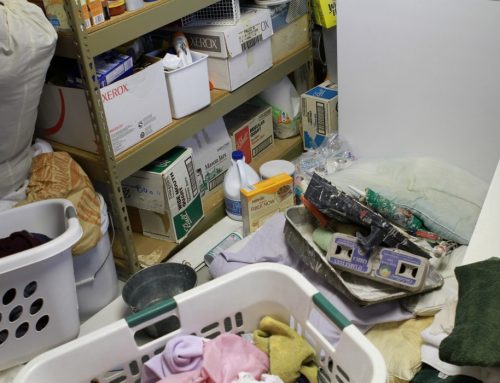Five Tips for Having an Estate Sale Without Losing Your Mind
Emptying out a house can come with a lot of unexpected emotions. It’s often much more physically challenging than we anticipate, as well as a lot more emotionally draining than expected. Right or wrong, we have a lot of feelings tied to the objects in our home. When it comes time to release a large portion of them, we aren’t always thinking clearly. Here is our best advice for having a good experience when preparing to have an estate sale.
Tip #1: Consider the alternatives. When considering whether you’ll hire a company to have an estate sale for you, ask yourself – what are my alternatives? How else will you empty out your home? Will you host and organize a garage sale? Run your own estate sale? (Be sure you have 3-4 people to help you run the sale and keep an eye on shoppers throughout the house, as well as to collect payment). Will you sell your items on Facebook Marketplace? Craigslist.com? Will you sell your items on eBay? (Do you know what that entails? Have you created an account, and investigated shipping policies, and insurance?) Will you haul the items in your car to a local Goodwill? Will you call a charity to pick up your donated items? (Keep in mind that they need to be packed in boxes and ready to go in the garage or at the curb for charities to accept them – most charities will not enter the home to remove the item.) Where will you get the boxes to pack those items in? Once you carefully consider the alternatives, you’ll soon realize how much is involved in liquidating an estate and see why many choose to hire a service like Changing Spaces SRS to handle all the details.
Tip #2: Go in the right order. Emptying a house is no easy task, and it will be made so much more difficult if you go out of order. Time and time again, most of the frustration our clients experience results from dismissing the following advice and going out of order.
*First, decide what you want to keep and move out of the home. Take everything you’re keeping with you.
*Next, ensure anything and everything you are giving to family or friends is then removed from the home.
*Return things like cable boxes to your provider, leaving ONLY items that are for sale in the home.
*Then it’s time for the estate sale company to come in to do their work. At Changing Spaces SRS, we will empty out every drawer, cupboard, and closet to organize what remains in the home and price it for a profitable estate sale. We cannot be responsible for anything that is not for sale that is left in the home.
*After the sale is over, there will be some items left (typically 15-25% of the contents of the home). Make a plan for what remains – we recommend using a clear-out hauling company and can help with those arrangements. These folks will come into the home with boxes and supplies, pack up everything that remains and bring them to a local charity, while also separating out the trash and items that can be recycled, leaving your home completely empty.
*Now the home is ready to be cleaned and put on the market. The process of emptying a home and preparing it for the market generally takes 3-4 weeks, which is why you should always avoid selling your home and scheduling a closing date before you have the move, estate sale, and clearout services scheduled. Selling the home is the “easy” part and can happen very quickly. Moving out, selling what remains, and donating/trashing the rest takes much more time and involves many moving parts. Going out of order means this process must be rushed and that’s when problems (and excess stress and frustration) arise.
Tip #3: Remember the bigger picture. The reason you need to empty out your home is that you are intending to sell it. Your home is by far the largest asset involved in this equation – and it’s worth a lot more money than your used couch. Don’t get too hung up on the prices you get for individual pieces in your home. Remember that it is, after all, used stuff. And it’s stuff that you’ve decided you no longer wish to keep. As professional estate liquidators, it is our job to get the most money we can out of the items in your home – but make no mistake, the bigger picture (and more valuable asset) involves getting rid of the items so that your home is empty and can be sold.
Don’t get too bogged down in the details. When you receive your list of items sold after your estate sale is over, try not to agonize over the details of how much money you got out of this end table, that lamp, or the heavy desk from the basement. And don’t compare the price it sold for to what you purchased it for. Furniture is a notoriously bad investment – you don’t purchase it hoping it will go up in value. Like clothing, books, and other consumer goods, the re-sale value of an item is often pennies on the dollar, no matter how new or old the item is. (Think about buying a shirt from a department store and the next week putting it on a garage sale and trying to get even 50% of what you paid for it originally – not going to happen!) What you should focus on instead is the total you received for the items in your home. And remember, those items were carried out of your home by the person who bought them and the whole process brings you that much closer to your goal of emptying out your home and preparing it for sale.
Tip #4: Your estate sale is not a reflection of you. It’s subtle, and in many cases occurs subconsciously, but it’s easy for us to equate ourselves with our possessions. It’s helpful to remember that the amount of money you get from selling your possessions is in no way a reflection of you, your value, or the memories you built in your home. It can feel pretty crummy to realize that shoppers don’t love your sofa or dining room table as much as you did, but the money you receive from re-selling these items second-hand is not a reflection of their worth. Their true value lies in the memories you made with the items, the comfort they brought to you, and the utility you enjoyed while owning them. Now their usefulness in your life has come to an end, and you are passing them on to another person to be used in another way. Separate yourself and your identity from those items.
Tip #5: DIY Don’t. Don’t try to sell an entire household’s worth of items or donate the entire contents of your home. It is no small job and will literally take you weeks or months to accomplish. What are your time and energy worth? This project will leave you feeling exhausted, overwhelmed, disappointed with the results, and physically drained. This is not a job to DIY. Focus your efforts instead on selecting the items you will pluck out of the home to keep, then hire someone to deal with and disperse the rest.





